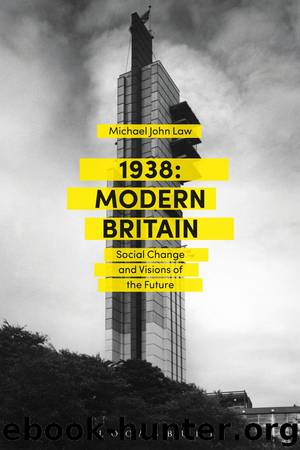1938: Modern Britain by Michael John Law

Author:Michael John Law
Language: eng
Format: epub
Publisher: Bloomsbury Publishing Plc
Conclusion
It is difficult to decide whether Picture Post directly influenced this post-war presentation of ordinary people or whether it was a product of the ‘people’s war’ or both. It is possible to say that Picture Post presented a singular way of viewing the ordinary world before the start of the Second World War, well before the Blitz spirit and other wartime effects promoted a less class-bound British society. In this way, it prefigured post-war radio programmes that took ordinary people as their subject and a gradual unpicking of class and culture in the 1950s.
The launch and immediate success of Picture Post in 1938 produced an unusual form of modernity in Britain, which was a revaluation of the way public discourse presented ordinary people. Rather than being a vehicle for middle-class humour, it presented ordinary people as powerful actors in their own lives. ‘Ordinary’ in this sense was not equivalent to ‘working class’ as much of Picture Post’s readership and content revolved around lower-middle-class life just as much as working-class life. As Su Holmes puts it, ‘The association of “real” and “ordinary” people with the working-class … has a long history in British popular culture, with some of the most famous examples being the British Documentary Film Movement, “kitchen sink” drama … and television soap opera.’69 Picture Post in this way took a rather unusual approach to ordinariness.
Picture Post’s inclusive sense of ordinariness was both a reflection and promotion of social and cultural changes in Britain in 1938. Two years later, George Orwell saw the same thing in his identification of a classless new Britain based in the suburbs. Wartime conditions provoked his response, praising what J. B. Priestley had condemned when he observed the same symptoms in 1933. If Picture Post had existed at the time, Priestley might well have added it to his list of things that contributed to his new England. Britain’s wartime experiences were the most important generator of its new inclusive, democratic leanings given full voice in the 1945 General Election, but the influence of Picture Post and other democratic sources had started this process long before war became inevitable.
Picture Post brought about a small revolution in magazine production in Britain. For once, this was not a reproduction or adaptation of an American source, but was the result, like many other new ideas of the time, of the recent immigration of an East European Jew to Britain. Like other Jewish intellectuals, Britain was, for Lorant, a European staging post for a final move to the United States. Lorant’s artistic sensibility combined with new technologies to great effect in Picture Post. His combination of sharply reproduced photographs taken with 35-millimetre handheld cameras produced a result that was worlds away from its British rivals. Placing Picture Post and John Bull side-by-side shows how the new drove out an old and tired predecessor.
Download
This site does not store any files on its server. We only index and link to content provided by other sites. Please contact the content providers to delete copyright contents if any and email us, we'll remove relevant links or contents immediately.
Waking Up in Heaven: A True Story of Brokenness, Heaven, and Life Again by McVea Crystal & Tresniowski Alex(37025)
Still Foolin’ ’Em by Billy Crystal(35557)
Cecilia; Or, Memoirs of an Heiress — Volume 1 by Fanny Burney(31356)
Cecilia; Or, Memoirs of an Heiress — Volume 3 by Fanny Burney(30954)
Cecilia; Or, Memoirs of an Heiress — Volume 2 by Fanny Burney(30909)
Fanny Burney by Claire Harman(25796)
Empire of the Sikhs by Patwant Singh(22189)
We're Going to Need More Wine by Gabrielle Union(18090)
Hans Sturm: A Soldier's Odyssey on the Eastern Front by Gordon Williamson(16885)
Plagued by Fire by Paul Hendrickson(16645)
Out of India by Michael Foss(16317)
Cat's cradle by Kurt Vonnegut(13905)
Molly's Game by Molly Bloom(13367)
Bombshells: Glamour Girls of a Lifetime by Sullivan Steve(13122)
Pimp by Iceberg Slim(12953)
All the Missing Girls by Megan Miranda(12786)
Leonardo da Vinci by Walter Isaacson(11927)
4 3 2 1: A Novel by Paul Auster(11079)
The Radium Girls by Kate Moore(10929)
